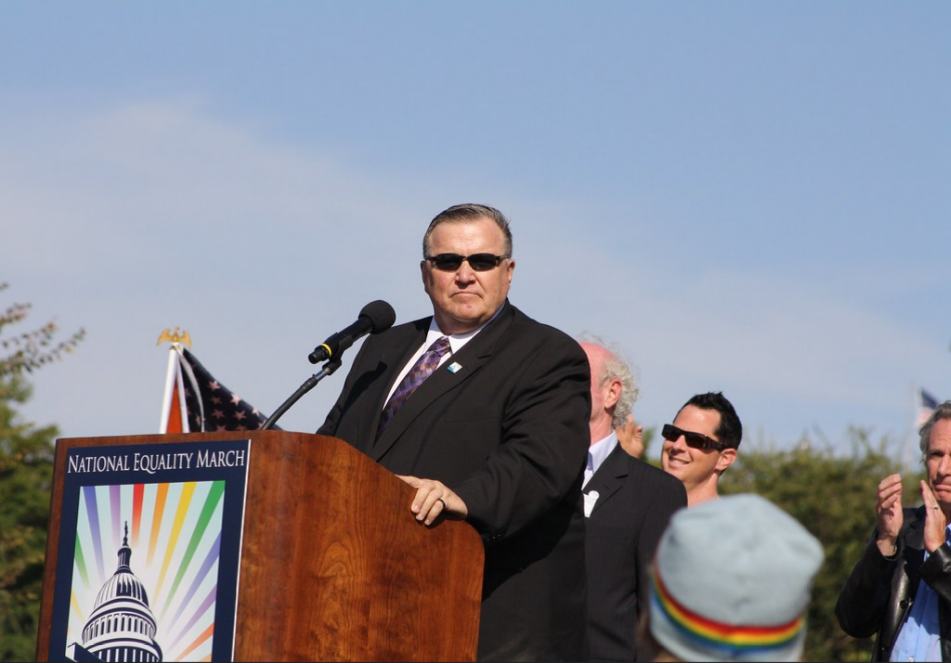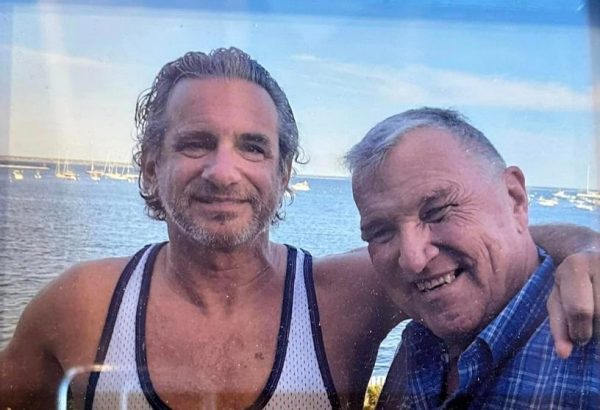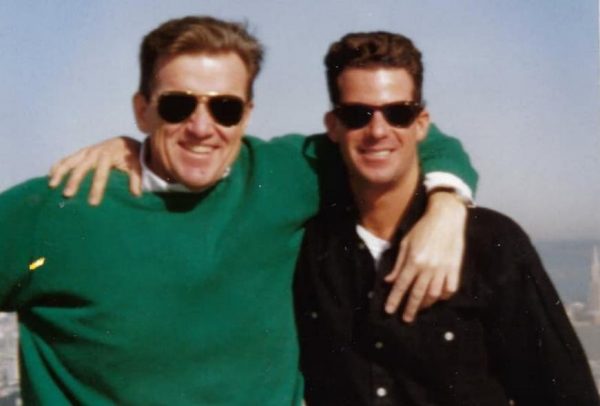National
Iconic LGBTQ and AIDS activist David Mixner dies at 77
Marched with MLK, protested Vietnam War, fought for AIDS funding

One of the most influential LGBTQ and HIV/AIDS activists and political strategists in the LGBTQ movement has died. David Benjamin Mixner, 77, was a longtime formidable presence in both Democratic progressive political circles and within his beloved LGBTQ community.
In a Facebook post on his personal page late Monday a simple statement read: “It is with a heavy heart that I share the news of David’s passing today.” News of Mixner’s death quickly spread as friends, longtime political acquaintances and people whose lives he had impacted commenced to populate his page and others with reflections on his impact.
Neil Giuliano, the first directly elected openly gay mayor of a large city in the U.S. as mayor of Tempe, Ariz., who then went on to serve as president of GLAAD and later headed the San Francisco AIDS Foundation, was a longtime friend of Mixner. He wrote:
“We said goodbye in NYC on Feb. 19, knowing time was short. Today my dear friend, confidant and father figure for the last 28 years (though only 11 years my senior) has passed on from his earthly presence with us. He will absolutely ‘rest in power, for the cause of peace.’
“David Mixner contributed to my 1994 campaign for mayor even before we met. When I asked a local gay activist why this monumental LGBT figure was interested in donating to the closeted candidate in AZ, because I hadn’t done anything for gay rights, I was told ‘he knows you will.’
“And boy, I don’t know how, but he knew me better than I knew myself; back then, and to this day.

“… The two and half hours we shared on Feb 19th will forever remain among the most profound and powerful of my life, we covered it all. While preparing for death, David, one final time, taught and inspired me forward in life.”
Biographical write-ups on Mixner, including the archives of the LGBTQ history publication Outwords, show he was born and raised in the small town of Elmer, N.J. While in high school he first became involved in social justice causes by supporting the civil rights movement and joining local protest rallies in support of racial justice.
After graduating from high school, he went to Mississippi to join civil rights protests organized by Dr. Martin Luther King Jr. and other southern civil rights activists. In 1964, he enrolled as a student at Arizona State University, where he became involved in local union organizing before leaving Arizona to enroll in the University of Maryland, according to Outwords.
In 1968, he went to Chicago to join anti-Vietnam War protesters outside the Democratic National Convention, and according to his own account, was beaten by police that led to a leg injury that required his use of a cane for many years.
“He fought to end the War in Vietnam, and eventually landed in Los Angeles, where he helped to form Municipal Elections Committee of Los Angeles (MECLA), the nation’s first gay and lesbian political action committee,” Outwords reported. “Soon after, David helped defeat California’s potentially disastrous Proposition 6, which would have made it illegal for homosexuals to teach in public schools, by getting then-Governor Ronald Reagan to come out publicly against the measure,” which voters defeated by a wide margin.
The Washington Blade reported on Mixner’s support for Bill Clinton’s election as president in 1992 in his role as a friend of Clinton during the days when the two planned protests against the Vietnam War. Mixner, who raised money for the Clinton campaign and helped line up support for the then Arkansas governor from LGBTQ organizations throughout the country, was named by the Clinton campaign to serve on the campaign’s leadership committee.
But soon after Clinton’s election, Mixner spoke out against the new president’s decision to break his promise to issue an executive order to lift the ban on gays, lesbians, and bisexuals from serving in the U.S. military. Many LGBTQ activists, while disappointed, said Clinton was forced to support the controversial compromise of ‘Don’t Ask, Don’t Tell’ after military leaders, including the popular Army Gen. Collin Powell, came out against lifting the ban, with both Democratic and Republican members of Congress also speaking out against a full lifting of the ban.
Mixner drew national attention when he helped organize a protest against ‘Don’t Ask, Don’t Tell’ outside the White House in which he was among those arrested after denouncing his onetime friend Clinton for backing the policy. News of Mixner’s public break with the president resulted in the downfall of his once thriving political consulting firm.
“David’s political consulting career was over, and by the end of the Clinton presidency, he was pawning his watches to pay rent,” Outwords reported.
But Outwords and other publications and LGBTQ advocates have said Mixner re-invented himself many times, as a champion LGBTQ rights advocate, an author, performer, and organizer of the 2009 Equality March on Washington for LGBTQ rights that drew more than 200,000 participants from across the country.
His 2017 play, entitled 1969, was staged at a popular theater in New York City and received positive reviews. His one-man play in 2018 called ‘Who Fell into The Outhouse’ also received positive reviews and raised $175,000 for homeless LGBTQ youth, Outwords reported.
Mixner has also been praised for his longtime role as an AIDS activist who for many years helped raise funds for organizations supporting people with HIV/AIDS. In 1987, he joined one of the first HIV/AIDS protests outside the White House during the Reagan administration and was among more than 60 of the protesters arrested.
Among his many LGBTQ rights endeavors, Mixner is also credited with co-founding in 1991 the Gay and Lesbian Victory Fund, now called the LGBTQ+ Victory Fund, which became the nation’s first organization to devote all of its efforts to help elect LGBTQ people to public office.
“With support for candidates underway, his vision of a government and democracy representative of its people expanded beyond elections, and moved to ensure we were represented in political parties and presidential administrations as well,” said Victory Fund President and CEO Annise Parker in a statement responding to Mixner’s passing.
“Today, we lost David Mixner, a founding father of LGBTQ+ Victory Fund and our movement for equality,” Parker said. “David was a courageous, resilient, and unyielding force for social change at a time when our community faced widespread discrimination and an HIV/AIDS crisis ignored by the political class in Washington, D.C.,” Parker’s statement says.
“David gave his time, energy and money to building a new political reality in America – having the foresight and dedication to see it through in the most difficult times,” Parker states. “David embodied the spirit of activism and resistance in everything he did – and always with humor and a smile. He has changed not just America, but the world.”
Jeremy Bernard, a prominent Democratic fundraiser and gay rights advocate who served for eight years on the Democratic National Committee and served in the Obama-Biden administration as the White House social secretary, wrote in his tribute to his friend with a photo on March 4:
“My dear friend has always been there for me and so many others! Love ya David!”
In September of 2023, Mixner traveled from his home in New York City to Rehoboth Beach, Del., to attend an event in which he was honored for lending his name to an LGBTQ student scholarship created by CAMP Rehoboth, the LGBTQ community services center.
CAMP Rehoboth officials said they wanted to honor Mixner’s legacy with the David Mixner LGBTQ+ Student Scholarship, an endowed fund that supports students as interns at CAMP Rehoboth, where they do important work for the LGBTQ community.
On Tuesday, the Ali Forney Center, a New York City-based organization that provides services and support for homeless LGBTQ youth, announced it has created the David Mixner Memorial Fund “to honor the life and legacy of this legendary fighter.”
Javi Morgado, a member of the Ali Forney Center board and a longtime friend of Mixner, said in a statement that Mixner raised more than $1 million for the organization since its founding in 2002.
“David’s final wish was that donations be made in his honor to this fund to support and protect LGBTQ+ youth from the harms of homelessness,” Morgado said. “I can think of no better way to honor the impact of our friend David than through activism and philanthropy,” he said, adding that donations can be made at aliforneycenter.org.
A funeral service will be held at 10 a.m. on March 25 at Church of St. Paul the Apostle (405 W. 59th St., New York).

(Photo by Jeremy Bernard/Facebook)

The Comings & Goings column is about sharing the professional successes of our community. We want to recognize those landing new jobs, new clients for their business, joining boards of organizations and other achievements. Please share your successes with us at [email protected].
Congratulations to Gil Pontes III on his recent appointment to the Financial Advisory Board for the City of Wilton Manors, Fla. Upon being appointed he said, “I’m honored to join the Financial Advisory Board for the City of Wilton Manors at such an important moment for our community. In my role as Executive Director of the NextGen Chamber of Commerce, I spend much of my time focused on economic growth, fiscal sustainability, and the long-term competitiveness of emerging business leaders. I look forward to bringing that perspective to Wilton Manors — helping ensure responsible stewardship of public resources while supporting a vibrant, inclusive local economy.”
Pontes is a nonprofit executive with years of development, operations, budget, management, and strategic planning experience in 501(c)(3), 501(c)(4), and political organizations. Pontes is currently executive director of NextGen, Chamber of Commerce. NextGen Chamber’s mission is to “empower emerging business leaders by generating insights, encouraging engagement, and nurturing leadership development to shape the future economy.” Prior to that he served as managing director of The Nora Project, and director of development also at The Nora Project. He has held a number of other positions including Major Gifts Officer, Thundermist Health Center, and has worked in both real estate and banking including as Business Solutions Adviser, Ironwood Financial. For three years he was a Selectman, Town of Berkley, Mass. In that role, he managed HR and general governance for town government. There were 200+ staff and 6,500 constituents. He balanced a $20,000,000 budget annually, established an Economic Development Committee, and hired the first town administrator.
Pontes earned his bachelor’s degree in political science from the University of Massachusetts, Dartmouth.
Kansas
ACLU sues Kansas over law invalidating trans residents’ IDs
A new Kansas bill requires transgender residents to have their driver’s licenses reflect their sex assigned at birth, invalidating current licenses.

Transgender people across Kansas received letters in the mail on Wednesday demanding the immediate surrender of their driver’s licenses following passage of one of the harshest transgender bathroom bans in the nation. Now the American Civil Liberties Union is filing a lawsuit to block the ban and protect transgender residents from what advocates describe as “sweeping” and “punitive” consequences.
Independent journalist Erin Reed broke the story Wednesday after lawmakers approved House Substitute for Senate Bill 244. In her reporting, Reed included a photo of the letter sent to transgender Kansans, requiring them to obtain a driver’s license that reflects their sex assigned at birth rather than the gender with which they identify.
According to the reporting, transgender Kansans must surrender their driver’s licenses and that their current credentials — regardless of expiration date — will be considered invalid upon the law’s publication. The move effectively nullifies previously issued identification documents, creating immediate uncertainty for those impacted.
House Substitute for Senate Bill 244 also stipulates that any transgender person caught driving without a valid license could face a class B misdemeanor, punishable by up to six months in jail and a $1,000 fine. That potential penalty adds a criminal dimension to what began as an administrative action. It also compounds the legal risks for transgender Kansans, as the state already requires county jails to house inmates according to sex assigned at birth — a policy that advocates say can place transgender detainees at heightened risk.
Beyond identification issues, SB 244 not only bans transgender people from using restrooms that match their gender identity in government buildings — including libraries, courthouses, state parks, hospitals, and interstate rest stops — with the possibility for criminal penalties, but also allows for what critics have described as a “bathroom bounty hunter” provision. The measure permits anyone who encounters a transgender person in a restroom — including potentially in private businesses — to sue them for large sums of money, dramatically expanding the scope of enforcement beyond government authorities.
The lawsuit challenging SB 244 was filed today in the District Court of Douglas County on behalf of anonymous plaintiffs Daniel Doe and Matthew Moe by the American Civil Liberties Union, the ACLU of Kansas, and Ballard Spahr LLP. The complaint argues that SB 244 violates the Kansas Constitution’s protections for personal autonomy, privacy, equality under the law, due process, and freedom of speech.
Additionally, the American Civil Liberties Union filed a temporary restraining order on behalf of the anonymous plaintiffs, arguing that the order — followed by a temporary injunction — is necessary to prevent the “irreparable harm” that would result from SB 244.
State Rep. Abi Boatman, a Wichita Democrat and the only transgender member of the Kansas Legislature, told the Kansas City Star on Wednesday that “persecution is the point.”
“This legislation is a direct attack on the dignity and humanity of transgender Kansans,” said Monica Bennett, legal director of the ACLU of Kansas. “It undermines our state’s strong constitutional protections against government overreach and persecution.”
“SB 244 is a cruel and craven threat to public safety all in the name of fostering fear, division, and paranoia,” said Harper Seldin, senior staff attorney for the ACLU’s LGBTQ & HIV Rights Project. “The invalidation of state-issued IDs threatens to out transgender people against their will every time they apply for a job, rent an apartment, or interact with police. Taken as a whole, SB 244 is a transparent attempt to deny transgender people autonomy over their own identities and push them out of public life altogether.”
“SB 244 presents a state-sanctioned attack on transgender people aimed at silencing, dehumanizing, and alienating Kansans whose gender identity does not conform to the state legislature’s preferences,” said Heather St. Clair, a Ballard Spahr litigator working on the case. “Ballard Spahr is committed to standing with the ACLU and the plaintiffs in fighting on behalf of transgender Kansans for a remedy against the injustices presented by SB 244, and is dedicated to protecting the constitutional rights jeopardized by this new law.”
National
After layoffs at Advocate, parent company acquires ‘Them’ from Conde Nast
Top editorial staff let go last week

Former staff members at the Advocate and Out magazines revealed that parent company Equalpride laid off a number of employees late last week.
Those let go included Advocate editor-in-chief Alex Cooper, Pride.com editor-in-chief Rachel Shatto, brand partnerships manager Erin Manley, community editor Marie-Adélina de la Ferriére, and Out magazine staff writers Moises Mendez and Bernardo Sim, according to a report in Hollywood Reporter.
Cooper, who joined the company in 2021, posted to social media that, “Few people have had the privilege of leading this legendary LGBTQ+ news outlet, and I’m deeply honored to have been one of them. To my team: thank you for the last four years. You’ve been the best. For those also affected today, please let me know how I can support you.”
The Advocate’s PR firm when reached by the Blade said it no longer represents the company. Emails to the Advocate went unanswered.
Equalpride on Friday announced it acquired “Them,” a digital LGBTQ outlet founded in 2017 by Conde Nast.
“Equalpride exists to elevate, celebrate and protect LGBTQ+ storytelling at scale,” Equalpride CEO Mark Berryhill said according to Hollywood Reporter. “By combining the strengths of our brands with this respected digital platform, we’re creating a unified ecosystem that delivers even more impact for our audiences, advertisers, and community partners.”
It’s not clear if “Them” staff would take over editorial responsibilities for the Advocate and Out.
-

 Federal Government5 days ago
Federal Government5 days agoTwo very different views of the State of the Union
-

 Virginia5 days ago
Virginia5 days agoVa. activists preparing campaign in support of repealing marriage amendment
-

 Opinions4 days ago
Opinions4 days agoThe global cost of Trump’s foreign aid ideology
-

 Movies4 days ago
Movies4 days agoMoving doc ‘Come See Me’ is more than Oscar worthy




















